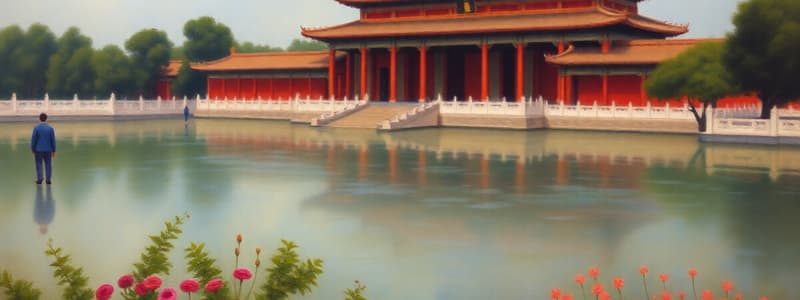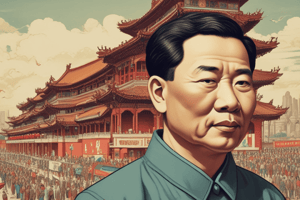Podcast
Questions and Answers
What major shift did Deng Xiaoping initiate in the Communist Party’s approach to legitimacy?
What major shift did Deng Xiaoping initiate in the Communist Party’s approach to legitimacy?
- Changed the focus from ideology to economic performance (correct)
- Emphasized revolutionary ideology over economic performance
- Promoted extreme nationalism as a legitimacy source
- Reinforced the cult of personality around party leadership
What event is associated with the international condemnation of China in the late 20th century?
What event is associated with the international condemnation of China in the late 20th century?
- The Tiananmen Square protests and subsequent crackdown (correct)
- The economic reforms initiated by Deng Xiaoping
- The signing of the Sino-British Joint Declaration
- The establishment of diplomatic relations with the United States
What was one of the significant consequences of the Tiananmen Square events for China’s international relations?
What was one of the significant consequences of the Tiananmen Square events for China’s international relations?
- Improved relations with Taiwan
- Diplomatic isolation and exclusion from key international meetings (correct)
- Enhanced status in international organizations
- Strengthened alliances with Western democracies
Which factor did Deng Xiaoping emphasize as crucial for the survival of the Communist Party in response to the Tiananmen Square protests?
Which factor did Deng Xiaoping emphasize as crucial for the survival of the Communist Party in response to the Tiananmen Square protests?
What emerging challenge did the post-Mao reforms face alongside the push for economic growth?
What emerging challenge did the post-Mao reforms face alongside the push for economic growth?
What principle did Deng Xiaoping emphasize regarding China's approach to international relations?
What principle did Deng Xiaoping emphasize regarding China's approach to international relations?
What impact did the Tiananmen incident have on China's political and economic reforms?
What impact did the Tiananmen incident have on China's political and economic reforms?
What model of governance does China utilize that emphasizes both central authority and local autonomy?
What model of governance does China utilize that emphasizes both central authority and local autonomy?
What was Deng Xiaoping's response to the political atmosphere following the Tiananmen incident?
What was Deng Xiaoping's response to the political atmosphere following the Tiananmen incident?
What was a significant consequence of China's international isolation after the Tiananmen incident?
What was a significant consequence of China's international isolation after the Tiananmen incident?
Study Notes
Post-Mao Reforms
- Mao's radical policies caused famine and massive casualties (over 20 million deaths) during the Cultural Revolution.
- Mao's death revealed a need for reform to maintain Communist Party control.
- The Third Plenary Session of the 11th Central Committee (December 1978) was a turning point, with Deng Xiaoping leading reforms focused on poverty reduction and economic growth.
- Economic growth and improved living standards were emphasized as reasons for maintaining the party.
- Reform efforts faced challenges including corruption, income inequality, inflation, and public dissatisfaction.
- The clash between democratic aspirations and authoritarian repression became heightened by contrasting developments globally, creating tensions.
- The Tiananmen Square protests, fueled by anger over corruption and dissatisfaction, led to a violent crackdown.
- The crackdown had significant domestic and international consequences, including mass arrests and severe economic sanctions, that damaged China's global image.
- China's relationship with Hong Kong and Taiwan deteriorated.
- Deng Xiaoping emphasized social stability and rejected significant policy shifts.
Contradictions in Performance Legitimacy
- The CCP faces a dilemma between adhering to Maoist structures and utilizing market mechanisms to drive economic growth.
- The CCP's legitimacy is increasingly tied to economic performance, but this also fosters political corruption and social injustice.
- Economic growth slowed, leading to societal demands for greater rights and fairness, challenging the CCP's legitimacy.
- CCP has two options: shift towards procedural legitimacy (granting more citizen rights and addressing corruption) or upholding Maoist ideals.
Expanding Control and Restricting Freedoms
- The CCP has returned to pre-reform methods to manage reform-created problems, focusing on strengthening control and restricting freedoms.
- Restrictions on private enterprise and freedoms gained during economic reforms were imposed.
- Citizens are seeking greater political reforms to safeguard their rights, leading to inevitable challenges to the CCP's authority.
- Xi Jinping's leadership has tightened central control, suppressed social forces, and restricted free speech.
- This reliance on the state's coercive machinery is rooted in systemic and practical considerations.
Investment, Domestic Demand, and Exports
- China's growth relies on investment, domestic demand, and exports.
- Government-led investments face diminishing returns, with real estate bubbles and rising local government debt threatening sustainability.
- Weak domestic demand is compounded by income inequality, leading to greater reliance on exports.
Challenges Facing the Belt and Road Initiative (BRI)
- Western opposition to BRI is increasing.
- BRI faces international challenges, particularly through competing initiatives from the US and the EU.
- BRI demonstrates faster execution and delivery compared to opposing efforts.
- Chinese investment in infrastructure and job creation contrast sharply with Western aid in Africa and Southeast Asia.
- China supports economic development, providing resources and infrastructure to developing nations in Africa, Southeast Asia, and others.
Studying That Suits You
Use AI to generate personalized quizzes and flashcards to suit your learning preferences.




